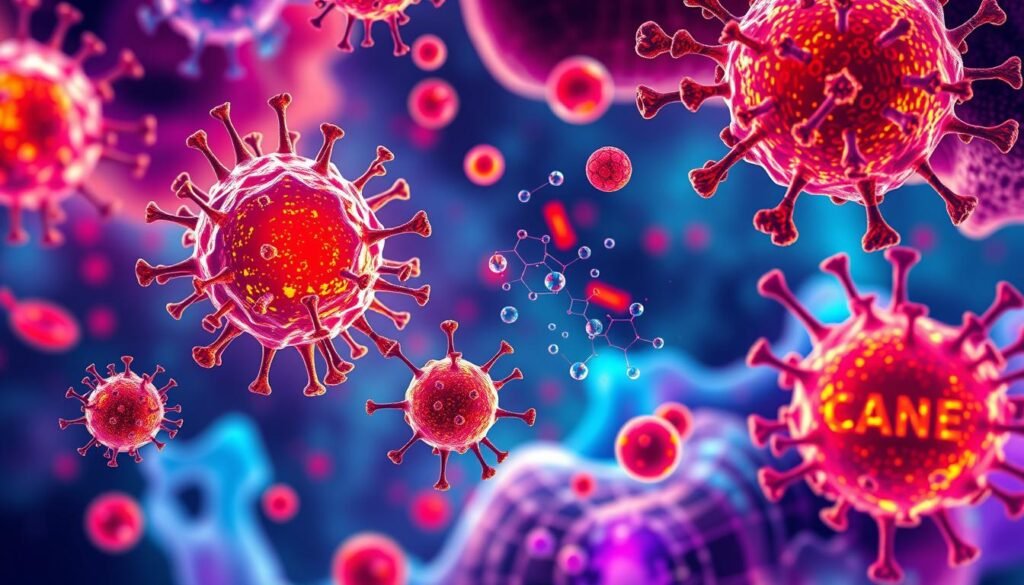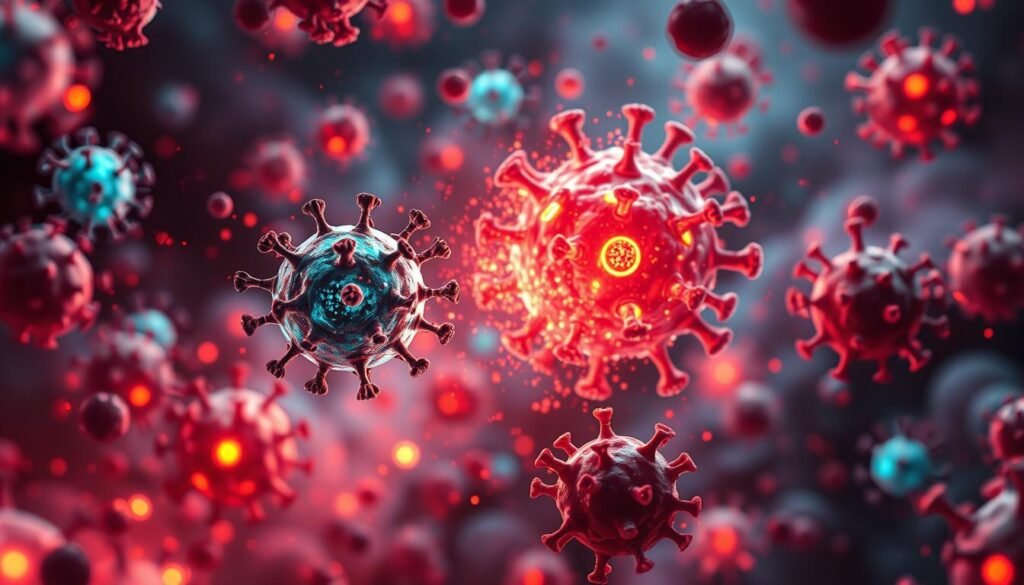Did you know nearly 1 in 8 men will get prostate cancer in their lifetime? This fact highlights the urgent need for new treatments. Immunotherapy for prostate cancer is a new way to fight this disease. It uses the body’s own immune system. Unlike older treatments that just remove or kill tumors, immunotherapy improves the body’s cancer defenses.
This article explores the power of immunotherapy, including immune checkpoint inhibitors, therapeutic antibodies, cancer vaccines, and adoptive cell therapy. These methods show how prostate cancer treatments are changing. They also show the bright future of immunotherapy. For more on vaccine treatments, visit this resource.
Key Takeaways
- Nearly 1 in 8 men will face a prostate cancer diagnosis.
- Immunotherapy seeks to enhance the body’s immune response against cancer cells.
- Approaches such as immune checkpoint inhibitors can significantly improve patient outcomes.
- Therapeutic antibodies play a pivotal role in modern prostate cancer treatment.
- Cancer vaccines are evolving as a key component of cancer immunotherapy.
- Adoptive cell therapy represents a cutting-edge initiative in prostate cancer treatment.
Understanding Prostate Cancer and Its Challenges
Prostate cancer affects many men around the world. It starts in the prostate gland with abnormal cells growing. This disease can grow slowly or quickly, which shows why detecting it early is key.
What is Prostate Cancer?
The prostate gland is vital for male reproductive health, helping produce semen. Cancer in this gland is tricky to diagnose and treat early on. Symptoms might not be obvious, making early tests like the PSA crucial for better health outcomes.
Standard Treatments for Prostate Cancer
There are different ways to tackle prostate cancer. Each one has its own pros and cons for managing the disease:
- Surgery: Often the first step is to remove the prostate gland to get rid of the cancer.
- Radiation therapy: Uses intense energy rays to kill cancer cells, offering a non-surgical choice for some patients.
- Hormone therapy: Stops hormones that cancer cells need to grow, works well for advanced cancer.
- Chemotherapy: Attacks cancer cells all over the body, but can have tough side effects.
Choosing the right treatment involves understanding how each one might affect the patient. Doctors consider the patient’s specific situation and the cancer’s features to make the best plan.
| Treatment Option | Benefits | Challenges |
|---|---|---|
| Surgery | Potentially curative | Risk of complications |
| Radiation Therapy | Non-invasive | Possible long-term side effects |
| Hormone Therapy | Effective for advanced disease | Resistance development |
| Chemotherapy | Targets widespread cancer | Significant side effects |
As the cancer progresses, options like immunotherapy might be considered. These alternatives help tackle new challenges in treating prostate cancer.
What is Immunotherapy?
Immunotherapy is an exciting way to fight cancer. It uses the body’s immune system to attack cancer cells. This method includes different techniques to boost or start immune responses against cancer. It shows promise for diseases like prostate cancer.
Definition and Overview of Cancer Immunotherapy
Cancer immunotherapy works with our own immune system to find and kill cancer cells. It doesn’t just target tumors directly. Instead, it helps the immune system recognize and eliminate abnormal cells. This could lead to lasting defense against cancer coming back.
How Immunotherapy Differs from Traditional Treatments
Immunotherapy and traditional treatments like chemotherapy differ greatly. Classic treatments kill cancer cells but can harm healthy tissues, causing side effects. Immunotherapy, however, boosts the immune response with less harm to normal cells. This approach is changing how we treat prostate cancer. It offers hope for better health and life quality for patients.
| Feature | Immunotherapy | Traditional Treatments |
|---|---|---|
| Mechanism of Action | Stimulates immune system | Kills cancer cells directly |
| Side Effects | Generally fewer, variable | Commonly severe |
| Disease Memory | Potential for lasting immunity | No long-term memory induced |
| Treatment Duration | Often longer, ongoing | Limited time frame |
Immunotherapy for Prostate Cancer: An Overview
Immunotherapy for prostate cancer is gaining a lot of attention in cancer research. It helps to understand its history to grasp today’s advanced treatments. This section looks into its progress and methods.
Historical Context of Immunotherapy in Cancer Treatment
The study of using the immune system to fight cancer dates back decades. Researchers first explored vaccines and cytokines to boost the body’s defense against cancer. The field has seen massive changes since then.
New discoveries about the immune system led to immune checkpoint inhibitors and adoptive cell therapies. These breakthroughs give us a range of treatment options today. They’re all based on in-depth clinical research.
Types of Immunotherapeutic Approaches
Several types of immunotherapy stand out for prostate cancer:
- Immune Checkpoint Inhibitors: They help the immune system recognize and destroy cancer cells.
- Therapeutic Antibodies: These target cancer cells directly, marking them for the immune system to attack.
- Cancer Vaccines: Vaccines train the immune system to fight prostate cancer longer and harder.
- Adoptive Cell Therapies: This method boosts a patient’s own immune cells to fight the cancer more effectively.
Each immunotherapy type is tested through clinical trials for effectiveness and safety. They offer hope to those fighting prostate cancer. More details on new research can be found at Cancer Research.
Immune Checkpoint Inhibitors: A Key Player in Prostate Cancer Treatment
Immune checkpoint inhibitors are changing how we treat prostate cancer. They target proteins that normally stop the immune system from attacking cancer cells. This lets the immune system better find and destroy these harmful cells. We’re learning more about how they work, which helps in treating prostate cancer at different stages.
Mechanism of Action of Immune Checkpoint Inhibitors
These inhibitors work by blocking proteins like PD-1 and CTLA-4. These proteins usually keep the immune system in check. Stopping them lets T cells attack cancer more effectively. This boosts the fight against prostate cancer, especially in hard-to-treat cases.
Approved Checkpoint Inhibitors for Prostate Cancer
Now, we have immune checkpoint inhibitors approved for prostate cancer. Pembrolizumab and nivolumab are among these. They work well for patients with certain advanced cancer signs. Adding these drugs to treatment plans is a big step forward. They offer new hope to those who need more than standard treatments.

| Checkpoint Inhibitor | Mechanism of Action | Indication |
|---|---|---|
| Pembrolizumab | Blocks PD-1, enhancing T-cell activation | Advanced prostate cancer with specific biomarkers |
| Nivolumab | Inhibits PD-1, allowing immune response against cancer | Patients with metastatic prostate cancer |
The Role of Therapeutic Antibodies
Therapeutic antibodies, especially monoclonal ones, are key in treating modern prostate cancer. They’re crafted to target specific proteins on the cancer cells. This targeting helps either kill the cells or mark them for destruction by the immune system. Their precision in identifying cancer markers makes them powerful allies in the cancer fight.
Understanding Monoclonal Antibodies in Cancer Therapy
Monoclonal antibodies are man-made proteins that act like the immune system’s defenders against harmful invaders. In cancer treatment, they attach to antigens on cancer cells, prompting cell death. This boosts the body’s own fight against cancer. They’ve introduced new possibilities for treating prostate cancer by providing individualized therapies.
Examples of Therapeutic Antibodies Used for Prostate Cancer
Some therapeutic antibodies have been effective in treating prostate cancer. Examples include:
- Trastuzumab: Initially for breast cancer, it’s now also considered for prostate cancer. It targets HER2 receptors that are sometimes abundant in these cancer cells.
- Sipuleucel-T: An FDA-approved vaccine boosting the immune response to prostate-specific antigen (PSA). It’s an example of how monoclonal antibodies can alter the immune system for better treatment outcomes.
Cancer Vaccines: Shaping the Immune Response
Cancer vaccines are key in fighting prostate cancer by boosting the body’s defenses. They train the immune system to spot and attack cancer cells. This method leverages the immune system’s strength to target prostate cancer with vaccine technology.
Mechanism Behind Cancer Vaccines
The way cancer vaccines work is by showing the immune system specific cancer cell markers. This teaches T-cells to recognize and destroy these markers. As a result, cancer vaccines push the body’s defenses to better tackle malignant cells, including those in prostate cancer.
Overview of Approved Cancer Vaccines for Prostate Cancer
The only cancer vaccine for prostate cancer approved by the FDA is Sipuleucel-T. It’s special because it uses a person’s dendritic cells to increase the immune attack on prostate cancer. Scientists are also looking into more vaccines, hoping that combining them might work even better for more patients.

| Vaccine | Type | Mechanism | FDA Approval |
|---|---|---|---|
| Sipuleucel-T | Cell-based | Uses dendritic cells to stimulate an immune response against prostate cancer | Approved |
| Research Vaccines | Various | Aiming to enhance recognition of prostate cancer antigens | In development |
Adoptive Cell Therapy: Harnessing the Power of T Cells
Adoptive cell therapy is a cutting-edge method used in prostate cancer treatment. It uses a patient’s T cells, modifying them to fight cancer better. It’s especially hopeful for those with advanced prostate cancer who’ve tried other treatments without success.
How Adoptive Cell Therapy Works
At its core, this therapy boosts the immune system’s fight against cancer. Doctors take T cells from the patient. They then change these cells to better recognize and attack prostate cancer.
This includes using CAR T-cell therapy. It gives T cells new receptors to directly target cancer cells.
Promising Results and Research in Prostate Cancer
Clinical trials are encouraging, showing lasting effects in some advanced prostate cancer cases. Researchers are working to find the best way to activate and grow T cells. This could make T cell therapy even more effective.
They’re also looking at using it with other treatments. The goal is to improve results for patients.
Oncolytic Virus Therapy: A Novel Approach
Oncolytic virus therapy is a new way to fight cancer. It uses special viruses to kill cancer cells but not harm healthy cells. This method kills cancer cells directly and helps boost the body’s immune system. So, it fights cancer in two ways.
What is Oncolytic Virus Therapy?
This treatment uses viruses that naturally destroy tumor cells. Oncolytic virus therapy targets cancer cells specifically, unlike other treatments. This means patients might have fewer side effects.
Current Research on Oncolytic Viruses for Prostate Cancer
Scientists are studying how certain viruses, like adenoviruses and oncolytic herpes simplex virus, can fight prostate cancer. Research is looking into these viruses for advanced prostate cancer and cases resistant to regular treatments. Early trials are showing good results. This might lead to new treatment options for prostate cancer.

| Type of Virus | Mechanism | Current Status in Research |
|---|---|---|
| Adenovirus | Selectively infects tumor cells, leading to cell death | Undergoing clinical trials for prostate cancer management |
| Oncolytic Herpes Simplex Virus | Induces immune response while directly killing cancer cells | Promising early results in reducing tumor size |
| Reovirus | Exploits cancer cell vulnerabilities to replicate and cause lysis | Preclinical success; human trials anticipated |
Research in this field is advancing. It shows oncolytic virus therapy could change how doctors treat prostate cancer. This therapy offers more personalized and efficient treatment options.
Cytokine Therapy: Enhancing Immune Responses
Cytokine therapy is a hopeful method for treating prostate cancer. It aims to strengthen the body’s fight against cancer. Using the body’s signaling proteins, like interleukins and interferons, it boosts immune cells.
This method increases the activity of T cells. It helps improve the outcomes for patients.
Researchers are looking at the best doses and combinations for cytokine therapy. They want to understand how our immune system can work better against cancer. Studies are also checking how it works with other immune-based treatments. This research makes the field very promising.
| Cytokine | Function | Prostate Cancer Application |
|---|---|---|
| Interleukin-2 (IL-2) | Stimulates T cell growth and activity | Enhances anti-tumor immunity |
| Interferon-alpha (IFN-α) | Induces antiviral and anti-tumor effects | Potential to slow tumor progression |
| Granulocyte-Macrophage Colony-Stimulating Factor (GM-CSF) | Enhances function of dendritic cells | May improve vaccine efficacy |
Conclusion
The treatment for prostate cancer is changing quickly, with immunotherapy leading the way. Immunotherapy boosts the immune system. It offers new choices besides the usual treatments. Immunotherapy uses things like immune checkpoint inhibitors, therapeutic antibodies, and cancer vaccines.
Researchers are also looking into new methods like adoptive cell therapy and oncolytic virus therapy. These developments make the future look brighter for patients. Treatments tailored to each person could greatly increase survival rates. They could also make life better for those living with prostate cancer.
If you want to know more about how these treatments work, you can check out this helpful resource. Research and new approaches keep improving the way we fight cancer. They bring us hope for better treatments in the future.